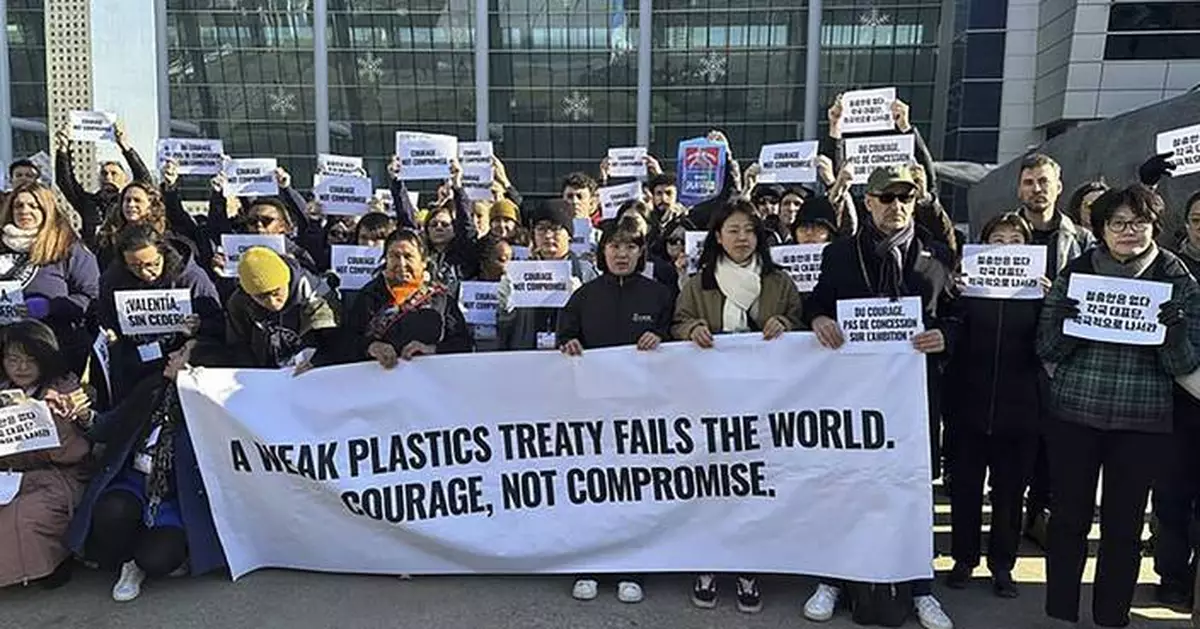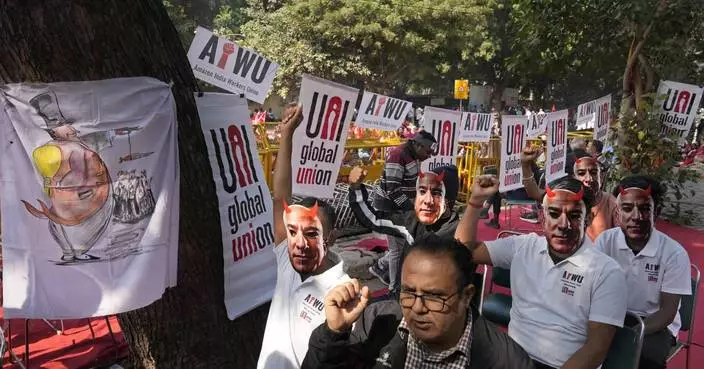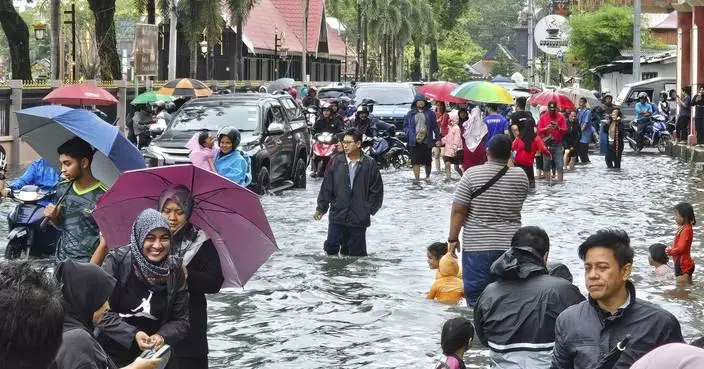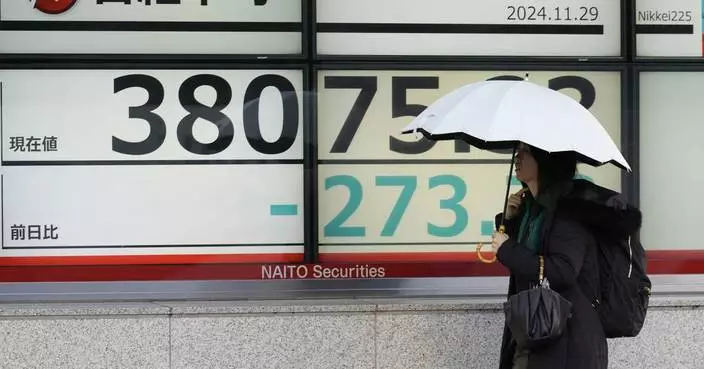BUSAN, South Korea (AP) — Negotiators working on a treaty to address the global crisis of plastic pollution inched closer to an agreement Friday, with more countries saying they want to address the total plastic on Earth.
The most contentious issue of the talks is whether there will be a limit on the amount of plastic that companies are allowed to produce. Panama proposed text for the treaty to address plastic production on Thursday.
Click to Gallery
From left, Tony Agotha, Special Envoy for Climate and Environment Diplomacy of European External Action Service, Sivendra Michael, Permanent Secretary for Environment and Climate Change of Fiji, Juan Carlos Monterrey, head of Panama's delegation, Andrew Yatilman, Secretary of the Department of Environment, Climate Change, and Emergency Management of Micronesia, and Olga Givernet, French Delegate Minister for Energy, attend a press conference at the fifth session of the Intergovernmental Negotiating Committee on Plastic Pollution in Busan, South Korea, Friday, Nov. 29, 2024. (AP Photo/Ahn Young-joon)
Tony Agotha, Special Envoy for Climate and Environment Diplomacy of European External Action Service, speaks during a press conference at the fifth session of the Intergovernmental Negotiating Committee on Plastic Pollution in Busan, South Korea, Friday, Nov. 29, 2024. (AP Photo/Ahn Young-joon)
Signboards are displayed at the venue for the fifth session of the Intergovernmental Negotiating Committee on Plastic Pollution in Busan, South Korea, Friday, Nov. 29, 2024. (AP Photo/Ahn Young-joon)
Olga Givernet, French Delegate Minister for Energy, speaks during a press conference at the fifth session of the Intergovernmental Negotiating Committee on Plastic Pollution in Busan, South Korea, Friday, Nov. 29, 2024. (AP Photo/Ahn Young-joon)
Andrew Yatilman, Secretary of the Department of Environment, Climate Change, and Emergency Management of Micronesia, speaks during a press conference at the fifth session of the Intergovernmental Negotiating Committee on Plastic Pollution in Busan, South Korea, Friday, Nov. 29, 2024. (AP Photo/Ahn Young-joon)
Sivendra Michael, Permanent Secretary for Environment and Climate Change of Fiji, speaks during a press conference at the fifth session of the Intergovernmental Negotiating Committee on Plastic Pollution in Busan, South Korea, Friday, Nov. 29, 2024. (AP Photo/Ahn Young-joon)
Juan Carlos Monterrey, head of Panama's delegation, speaks during a press conference at the fifth session of the Intergovernmental Negotiating Committee on Plastic Pollution in Busan, South Korea, Friday, Nov. 29, 2024. (AP Photo/Ahn Young-joon)
From left, Tony Agotha, Special Envoy for Climate and Environment Diplomacy of European External Action Service, Sivendra Michael, Permanent Secretary for Environment and Climate Change of Fiji, Juan Carlos Monterrey, head of Panama's delegation, Andrew Yatilman, Secretary of the Department of Environment, Climate Change, and Emergency Management of Micronesia, and Olga Givernet, French Delegate Minister for Energy, attend a press conference at the fifth session of the Intergovernmental Negotiating Committee on Plastic Pollution in Busan, South Korea, Friday, Nov. 29, 2024. (AP Photo/Ahn Young-joon)
Pamela Miller, Co-chair of the International Pollutants Elimination Network (IPEN), speaks during a press conference with IPEN members at the fifth session of the Intergovernmental Negotiating Committee on Plastic Pollution in Busan, South Korea, Friday, Nov. 29, 2024. (AP Photo/Ahn Young-joon)
Yuyun Ismawati, Co-chair of the International Pollutants Elimination Network (IPEN), speaks during a press conference with IPEN members at the fifth session of the Intergovernmental Negotiating Committee on Plastic Pollution in Busan, South Korea, Friday, Nov. 29, 2024. (AP Photo/Ahn Young-joon)
Environment activists hold a press conference calling for a strong global plastics treaty outside of the venue for the fifth session of the Intergovernmental Negotiating Committee on Plastic Pollution in Busan, South Korea, Friday, Nov. 29, 2024. (Son Hyung-joo/Yonhap via AP)
Environment activists hold a press conference calling for a strong global plastics treaty outside of the venue for the fifth session of the Intergovernmental Negotiating Committee on Plastic Pollution in Busan, South Korea, Friday, Nov. 29, 2024. (AP Photo/Jennifer McDermott)
Juan Carlos Monterrey, head of Panama's delegation, said it's a compromise proposal to build consensus because it does not include a numerical target or production cap. Instead, it says countries would adopt a global target at a later conference of the parties meeting.
Support for Panama's proposal quickly grew to over 100 countries. Some plastic-producing and oil and gas countries, including Saudi Arabia, vigorously oppose including plastic production in the treaty, calling it a red line. Russia’s delegation has said if the world is serious about this treaty, negotiators must concentrate on provisions acceptable for all delegations.
Luis Vayas Valdivieso, the committee chair from Ecuador, issued a paper on Friday with draft treaty text, condensing the views expressed by negotiators during the week. The treaty article on production has Panama's proposal. The other option is to strike that article.
“This is great! This is great,” Monterrey said as he read the document on his cellphone. “It is a big show of force, of muscle, for those countries that are ambitious. And also this shows that consensus is still possible,” he said in an interview.
Global plastics production is set to reach 736 million tons by 2040, up 70% from 2020, without policy changes, according to the Organization for Economic Cooperation and Development.
Environmental organizations demonstrated with signs outside the convention center Friday morning, demanding that negotiators show courage.
Many of those organizations want a treaty that addresses both the volume of production and chemicals of concern used in plastic products. The draft treaty text does not contain global, legally-binding controls on any of those chemicals. Countries that oppose such a provision, and plastics industry leaders, have said the treaty is not the proper venue to regulate chemicals.
Fiji's delegation said it would not support a treaty without a provision on chemicals of concern.
“The world is watching. The world sees the divide in the room for what it is,” Sivendra Michael, Fiji's permanent secretary for environment and climate change, said at a press conference about the importance of production in the plastics treaty. “The divide is between those, all of us here, looking to protect the people and the planet and those looking to protect the profits in the interests of the past and present industries.”
Anthony Agotha, with the European Union delegation, said the “time for freedom to pollute should be over.”
Graham Forbes, head of the Greenpeace delegation, said the new paper is a “weak attempt to force us to reach a conclusion and get a treaty for treaty’s sake,” with the only silver lining being the inclusion of a process for achieving a global target to reduce plastic production.
Negotiators began meeting Monday in Busan. They split into groups to consider text for treaty articles. By the midpoint of the negotiations, none had agreed to anything. They were having long discussions over topics where there’s more agreement, such as the need to manage plastic waste better. And they hadn't settled on some of the basics of the treaty, such as the scope and definitions.
Valdivieso told them Wednesday night their progress was too slow and they had to speed up significantly.
The delegations will now discuss Valdivieso's paper and decide whether to agree to the articles. The meeting ends late Sunday or early Monday.
U.N. Environment Program Executive Director Inger Andersen said there's still enough time to land an agreement, “if we work hard.”
The Associated Press’ climate and environmental coverage receives financial support from multiple private foundations. AP is solely responsible for all content. Find AP’s standards for working with philanthropies, a list of supporters and funded coverage areas at AP.org.
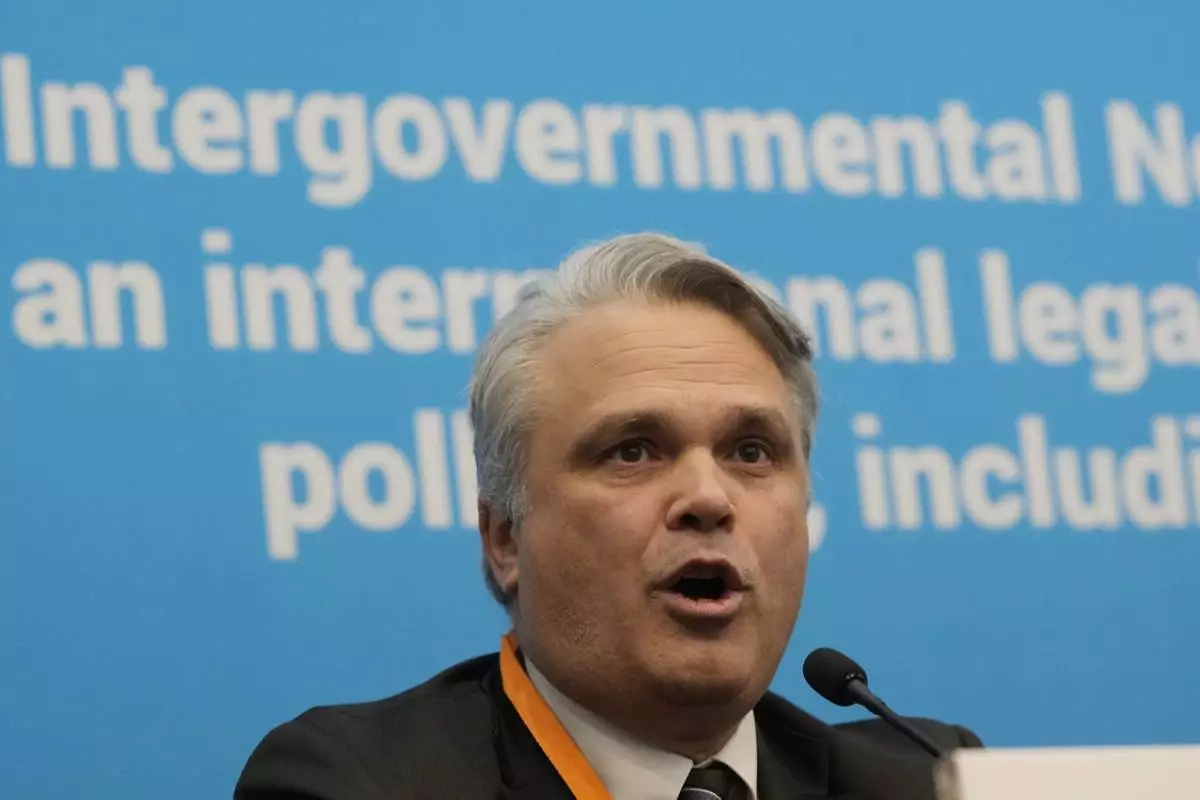
Tony Agotha, Special Envoy for Climate and Environment Diplomacy of European External Action Service, speaks during a press conference at the fifth session of the Intergovernmental Negotiating Committee on Plastic Pollution in Busan, South Korea, Friday, Nov. 29, 2024. (AP Photo/Ahn Young-joon)
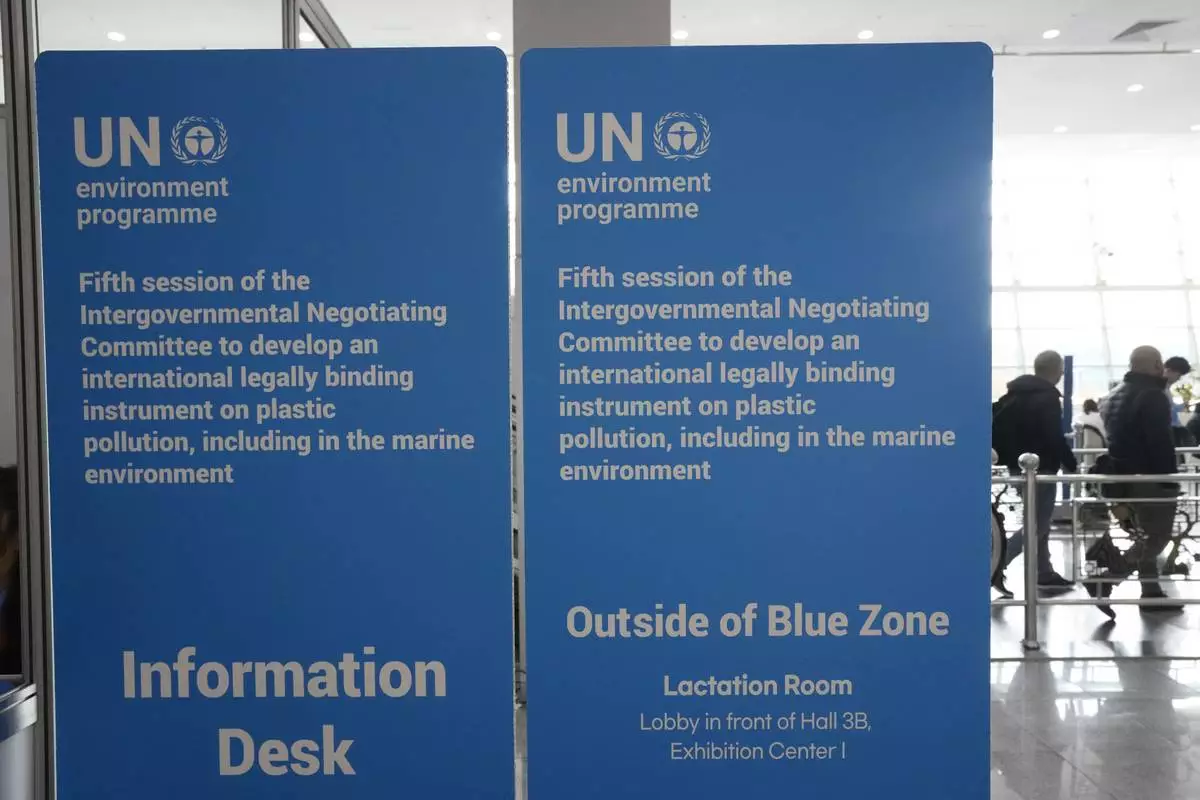
Signboards are displayed at the venue for the fifth session of the Intergovernmental Negotiating Committee on Plastic Pollution in Busan, South Korea, Friday, Nov. 29, 2024. (AP Photo/Ahn Young-joon)
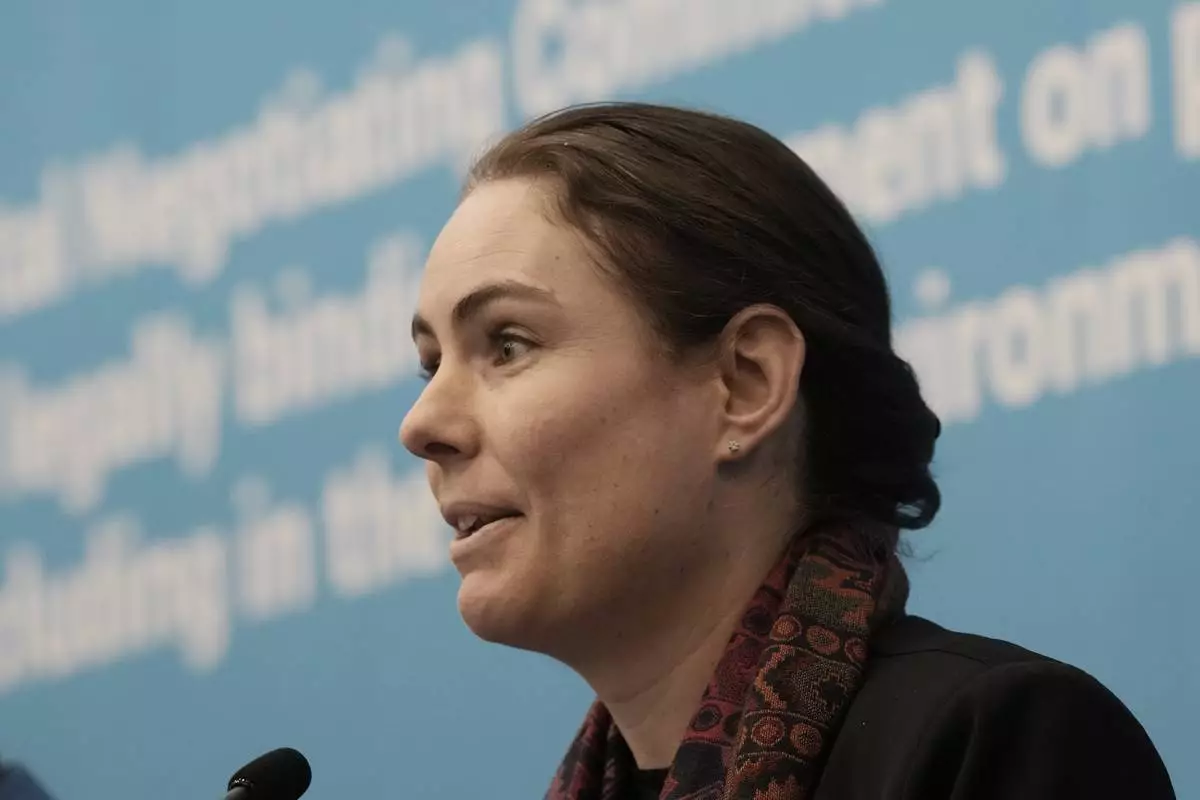
Olga Givernet, French Delegate Minister for Energy, speaks during a press conference at the fifth session of the Intergovernmental Negotiating Committee on Plastic Pollution in Busan, South Korea, Friday, Nov. 29, 2024. (AP Photo/Ahn Young-joon)
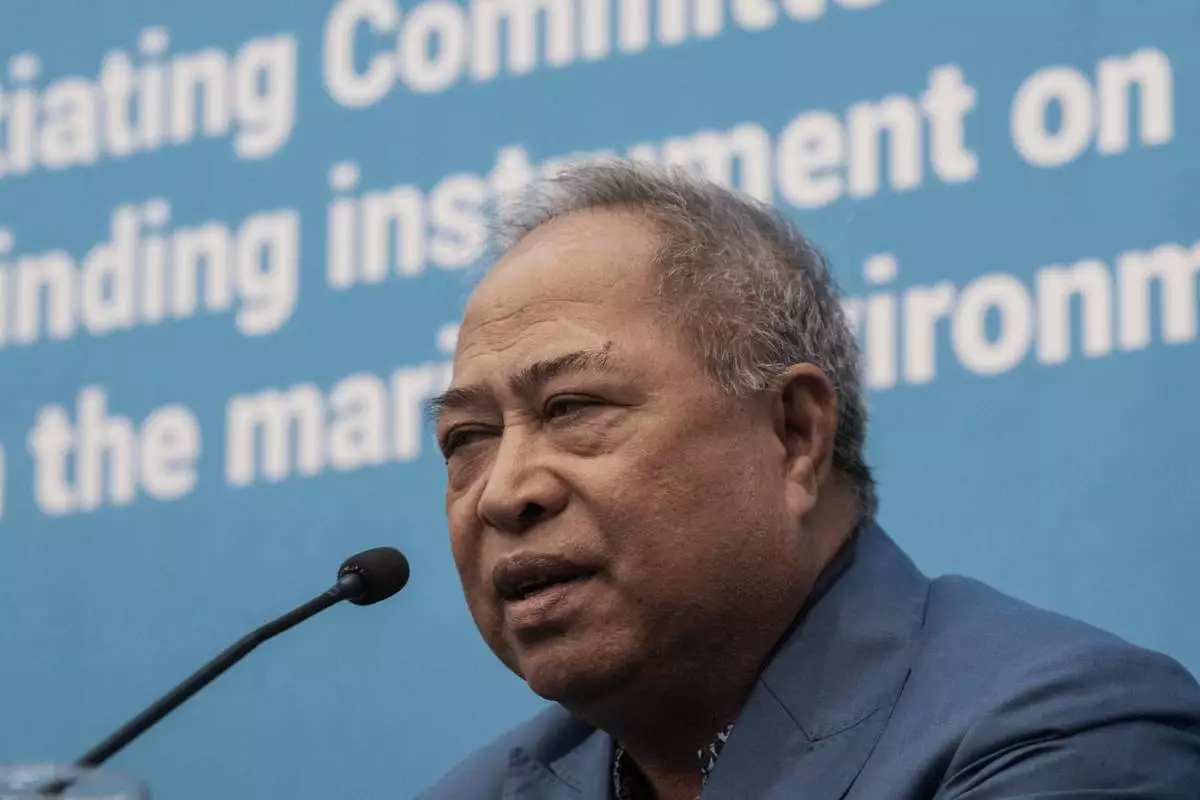
Andrew Yatilman, Secretary of the Department of Environment, Climate Change, and Emergency Management of Micronesia, speaks during a press conference at the fifth session of the Intergovernmental Negotiating Committee on Plastic Pollution in Busan, South Korea, Friday, Nov. 29, 2024. (AP Photo/Ahn Young-joon)
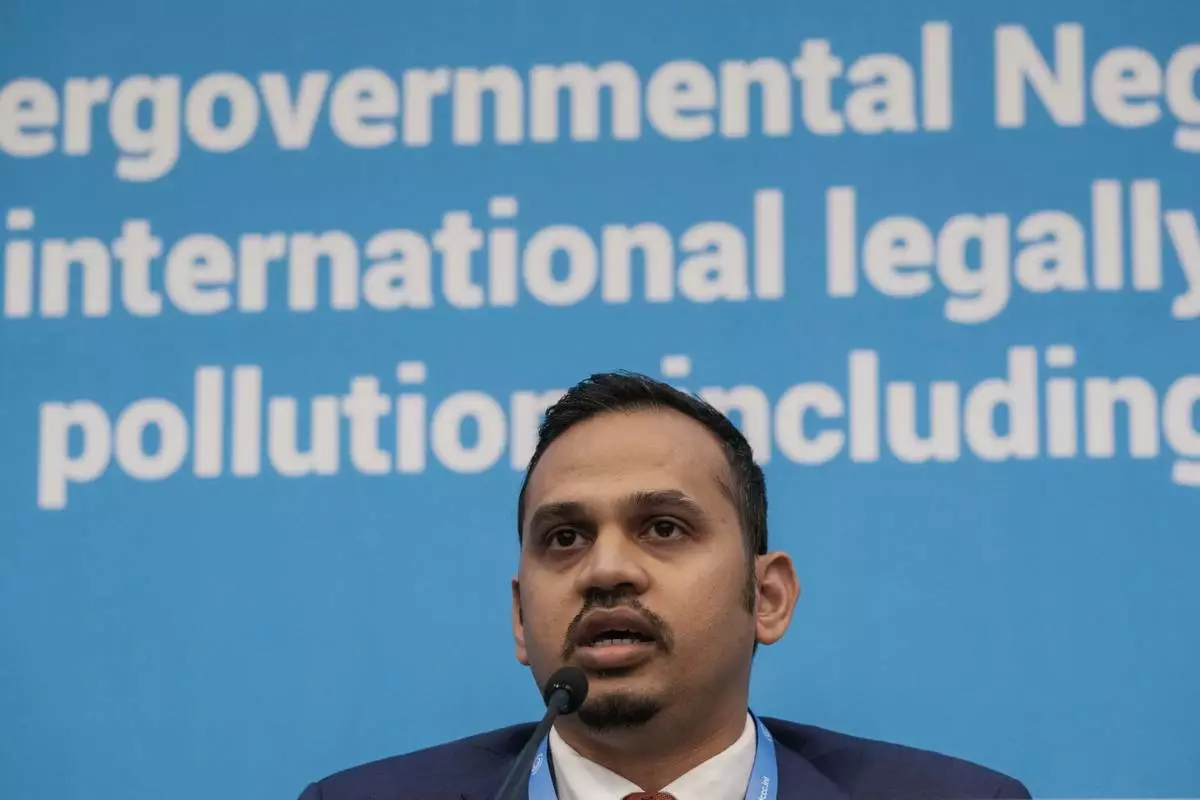
Sivendra Michael, Permanent Secretary for Environment and Climate Change of Fiji, speaks during a press conference at the fifth session of the Intergovernmental Negotiating Committee on Plastic Pollution in Busan, South Korea, Friday, Nov. 29, 2024. (AP Photo/Ahn Young-joon)
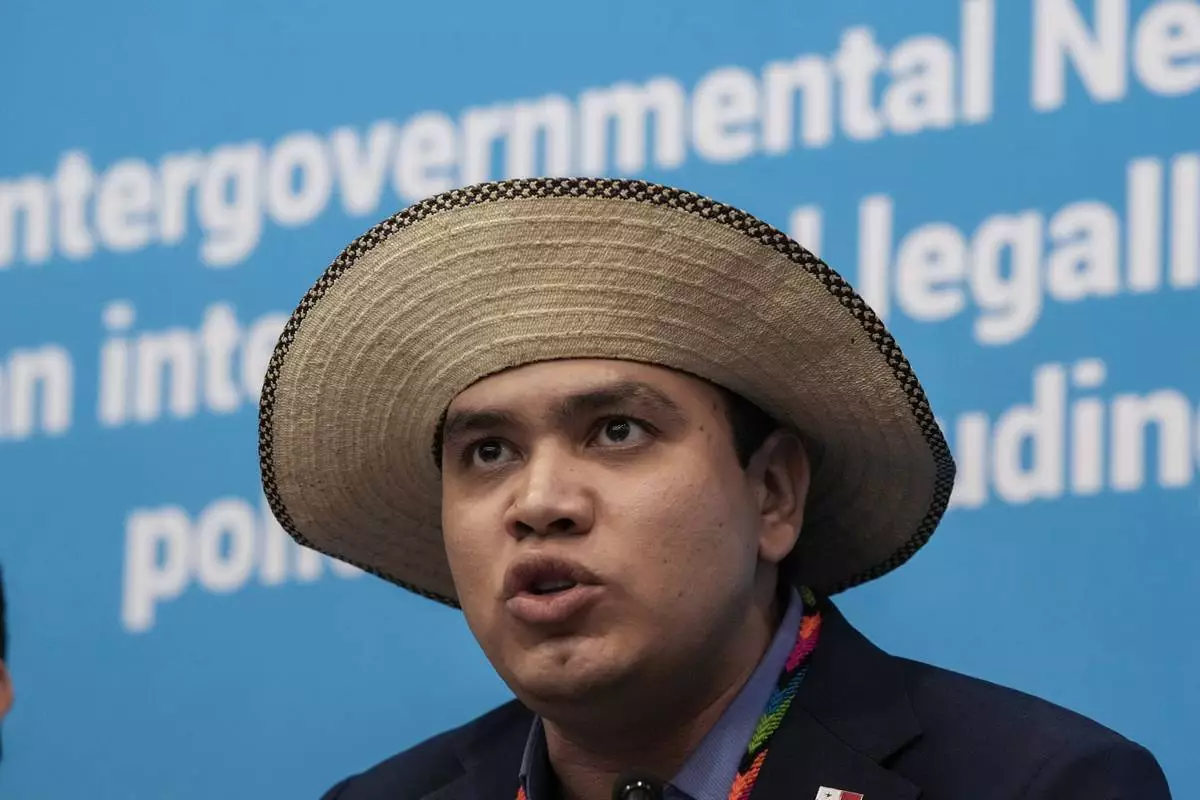
Juan Carlos Monterrey, head of Panama's delegation, speaks during a press conference at the fifth session of the Intergovernmental Negotiating Committee on Plastic Pollution in Busan, South Korea, Friday, Nov. 29, 2024. (AP Photo/Ahn Young-joon)
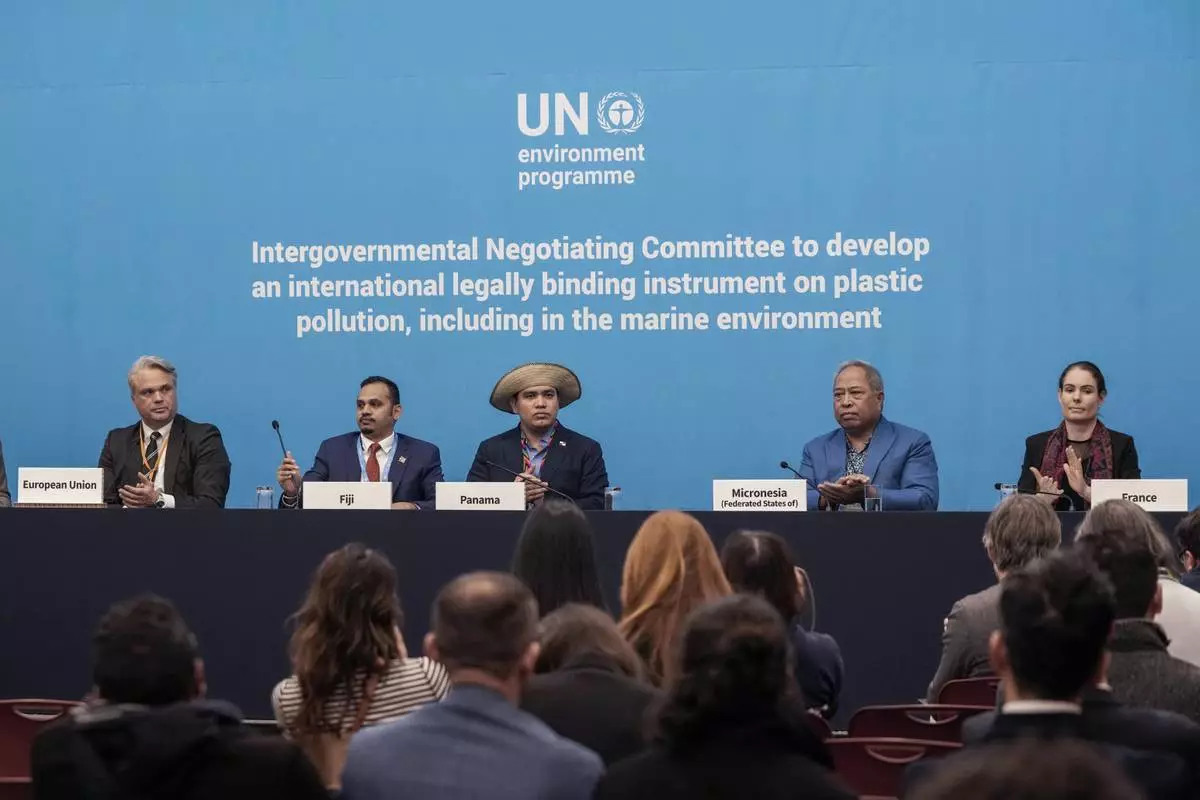
From left, Tony Agotha, Special Envoy for Climate and Environment Diplomacy of European External Action Service, Sivendra Michael, Permanent Secretary for Environment and Climate Change of Fiji, Juan Carlos Monterrey, head of Panama's delegation, Andrew Yatilman, Secretary of the Department of Environment, Climate Change, and Emergency Management of Micronesia, and Olga Givernet, French Delegate Minister for Energy, attend a press conference at the fifth session of the Intergovernmental Negotiating Committee on Plastic Pollution in Busan, South Korea, Friday, Nov. 29, 2024. (AP Photo/Ahn Young-joon)
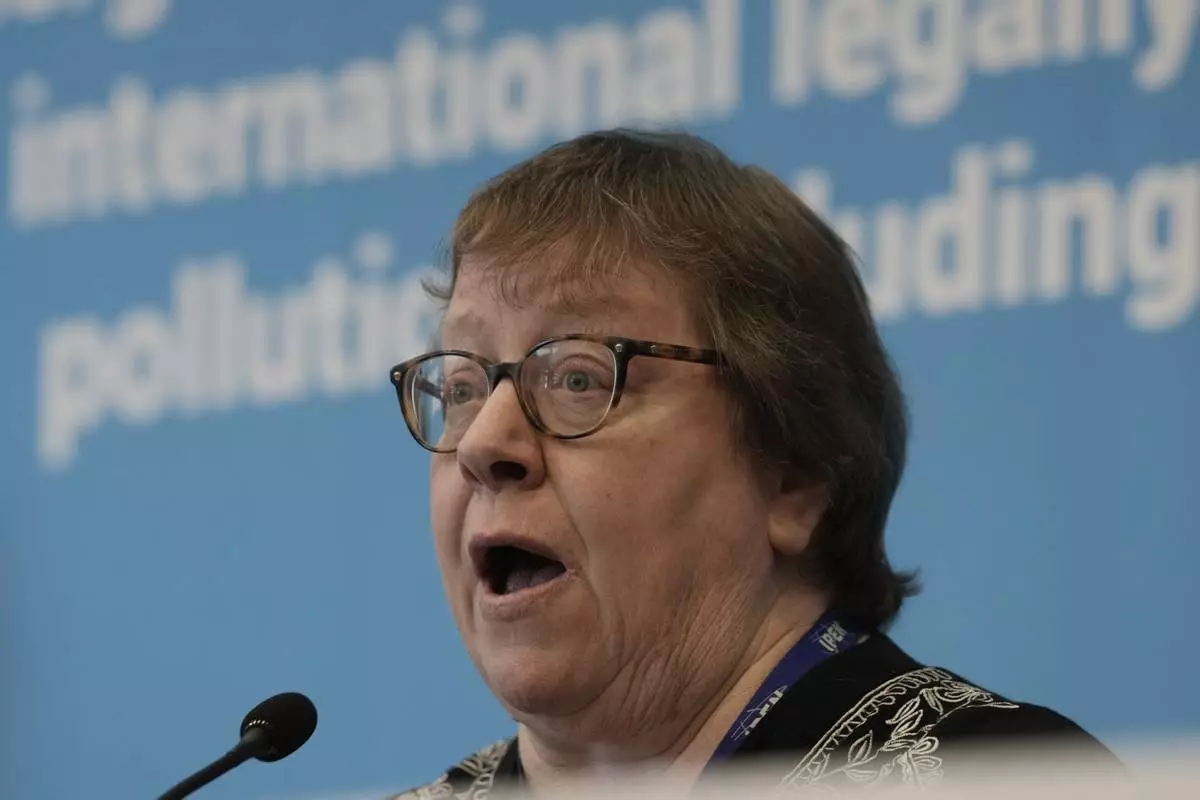
Pamela Miller, Co-chair of the International Pollutants Elimination Network (IPEN), speaks during a press conference with IPEN members at the fifth session of the Intergovernmental Negotiating Committee on Plastic Pollution in Busan, South Korea, Friday, Nov. 29, 2024. (AP Photo/Ahn Young-joon)
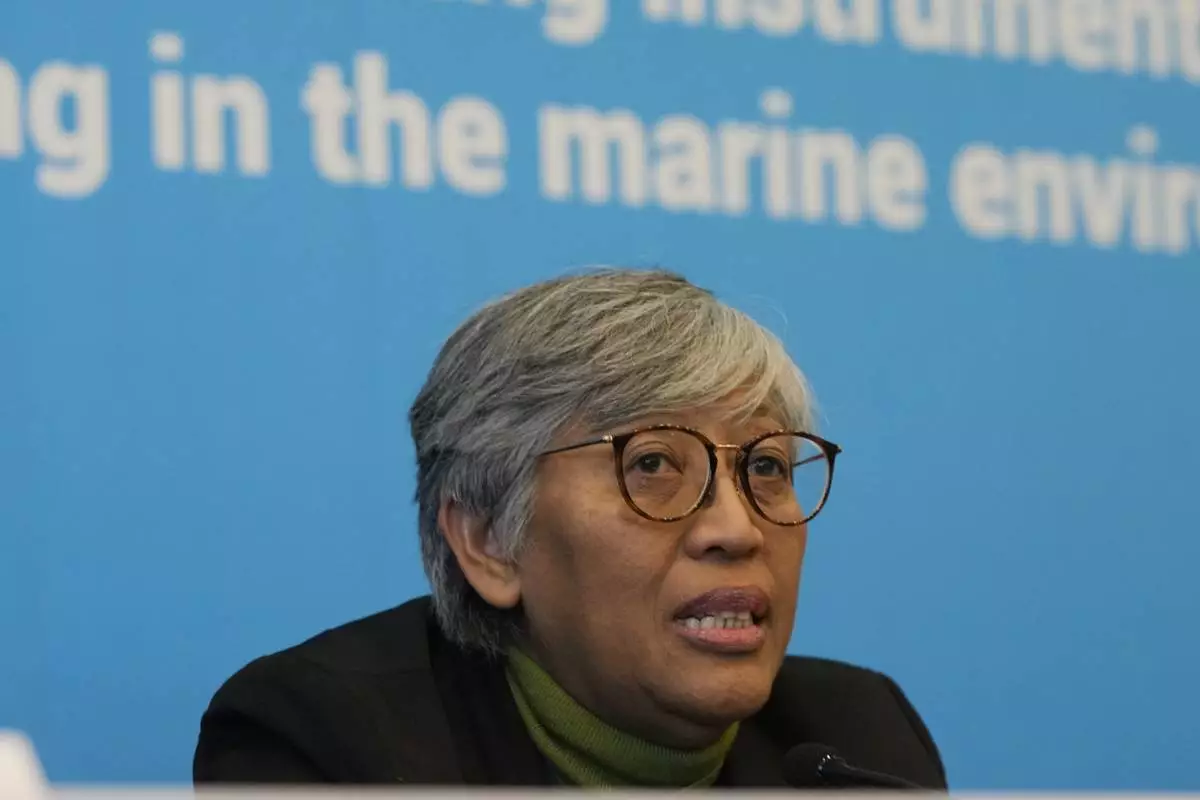
Yuyun Ismawati, Co-chair of the International Pollutants Elimination Network (IPEN), speaks during a press conference with IPEN members at the fifth session of the Intergovernmental Negotiating Committee on Plastic Pollution in Busan, South Korea, Friday, Nov. 29, 2024. (AP Photo/Ahn Young-joon)
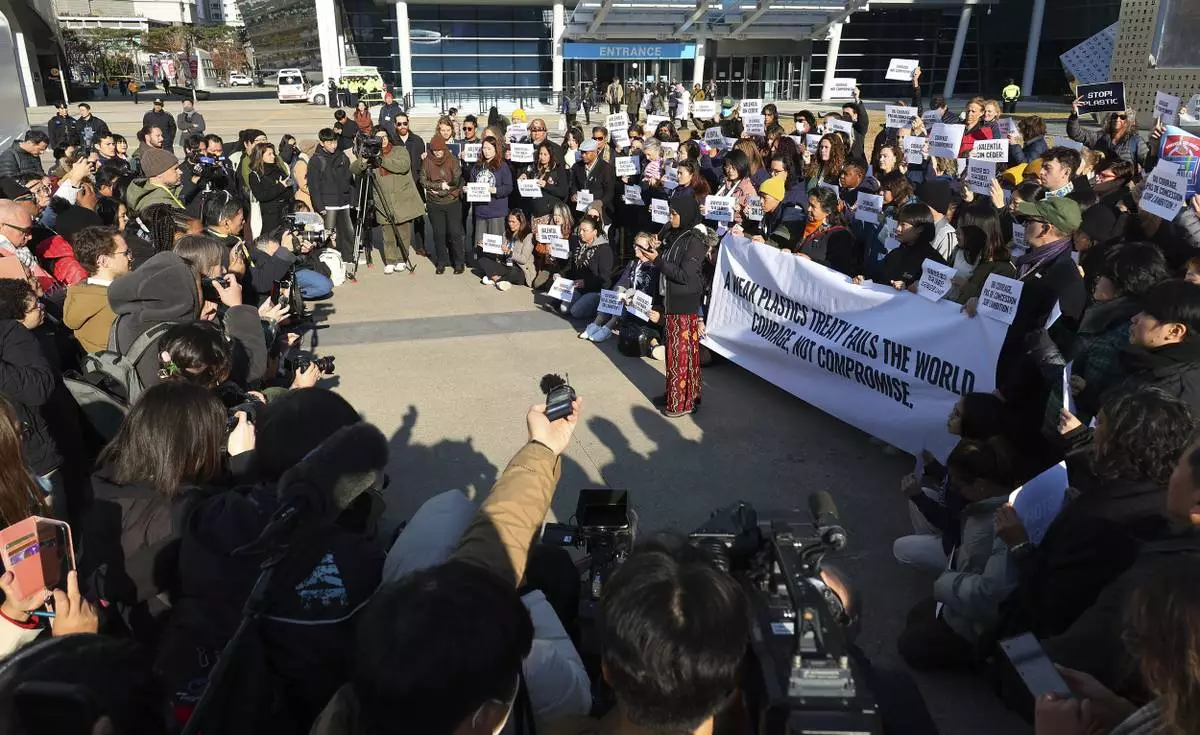
Environment activists hold a press conference calling for a strong global plastics treaty outside of the venue for the fifth session of the Intergovernmental Negotiating Committee on Plastic Pollution in Busan, South Korea, Friday, Nov. 29, 2024. (Son Hyung-joo/Yonhap via AP)
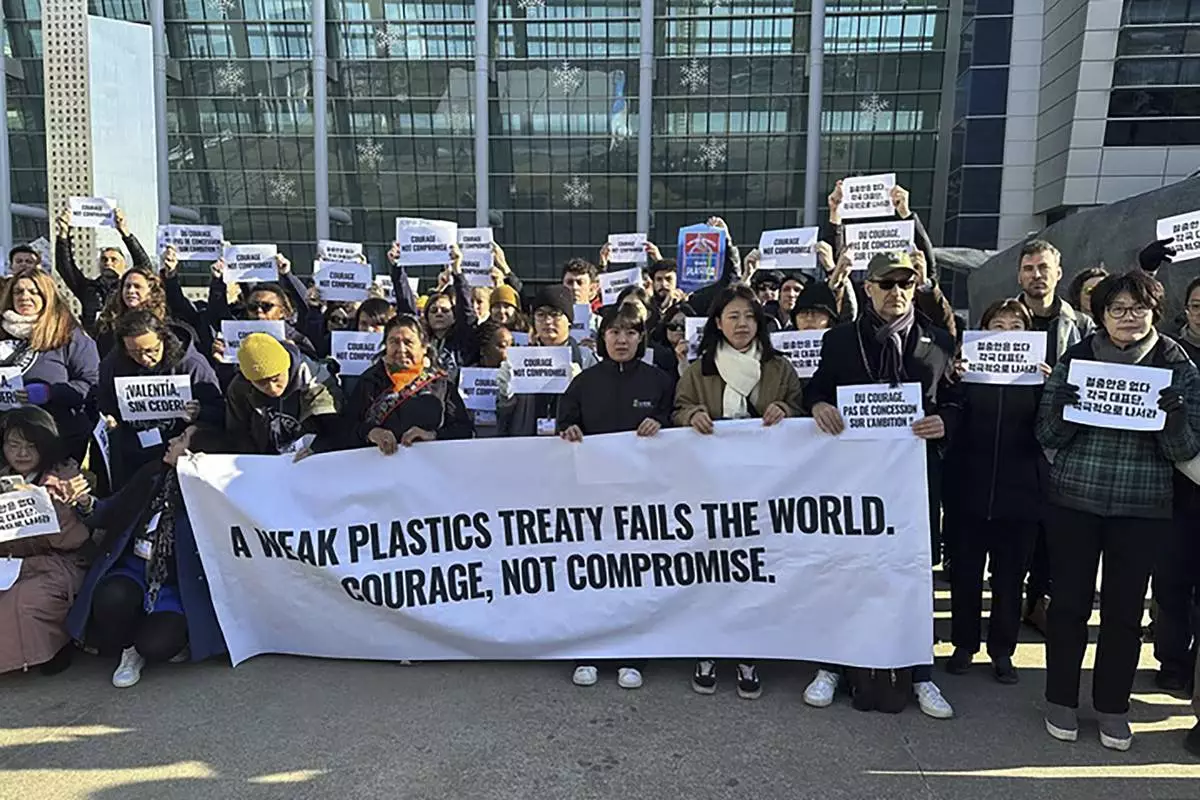
Environment activists hold a press conference calling for a strong global plastics treaty outside of the venue for the fifth session of the Intergovernmental Negotiating Committee on Plastic Pollution in Busan, South Korea, Friday, Nov. 29, 2024. (AP Photo/Jennifer McDermott)
LONDON (AP) — British lawmakers started a historic debate Friday on a proposal to help terminally ill adults end their lives in England and Wales, an issue that has divided Parliament as well as the country at large.
It's the first time the House of Commons has had the opportunity to vote on legalizing what some people call “assisted dying” while others term as “assisted suicide” in nearly a decade — and it looks like it will be a close result.
Ahead of the debate on the Terminally Ill Adults (End of Life) Bill, around 180 lawmakers have indicated they will back the proposal, while about 150 have said they won't. The other 300 or so lawmakers have either yet to make up their mind or have not disclosed how they will vote.
The debate is set to be impassioned, touching on issues of ethics, grief, the law, religion, crime and money. Many lawmakers plan to recount personal experiences while others will focus on the impact on the hard-pressed state-run National Health Service and how to safeguard the most vulnerable from being exploited.
Around 160 members of parliament have indicated they would like to make a speech during the debate, but the speaker of the House of Commons, Lyndsay Hoyle, said it's unlikely that they all will have a chance to do so.
A vote in favor of the bill would send it to another round of hearings, where it will face further scrutiny and votes in both Houses of Parliament. If ultimately approved, any new law is unlikely to come into effect within the next two to three years.
A vote against it would kill it.
“Let's be clear, we're not talking about a choice between life or death, we are talking about giving dying people a choice about how to die,” the bill's main sponsor, Kim Leadbeater, said in the opening speech in a packed chamber.
She conceded that it's not an easy decision for lawmakers but that “if any of us wanted an easy life, they’re in the wrong place.”
Although the current bill was proposed by a member of the ruling center-left Labour Party, it is an open vote with no pressure from the government on supporting it.
As the debate started, supporters of both sides gathered outside Parliament.
The contentious bill would allow adults expected to have fewer than six months to live to request and be provided with help to end their life, subject to safeguards and protections. They would have to be capable of taking the fatal drugs themselves.
Lawmakers, who have been holding emotional meetings with constituents and searching their souls, are due to debate the issue that crosses political lines.
Supporters say the law would provide dignity to the dying and prevent unnecessary suffering, while ensuring there are enough safeguards to prevent those near the end of their lives from being coerced into taking their own life. Opponents say it would put vulnerable people at risk, fearing that some would be coerced to end their lives and that some elderly or disabled people may opt for death so they don't become a burden.
It's the first time the House of Commons has debated an assisted dying bill since 2015, when a similar measure failed. Only around a third of the lawmakers from that parliament are still in office.
Prime Minister Keir Starmer, who has previously supported assisted dying, said the government will remain neutral and he wouldn't reveal how he would vote. Some members of his cabinet have said they will support the bill, while others are against it. Kemi Badenoch, the leader of the main opposition Conservative Party, has said she'll vote against.
Under the proposed legislation, only those over 18 years old in England and Wales and who are expected to die within six months can request assisted dying. They must have the mental capacity to make a choice about the end of their life and will be required to make two separate declarations about their wish to die.
Other countries that have legalized assisted suicide include Australia, Belgium, Canada and parts of the United States, with regulations on who is eligible varying by jurisdiction.
Assisted suicide is different from euthanasia, allowed in the Netherlands and Canada, which involves healthcare practitioners administering a lethal injection at the patient's request in specific circumstances.
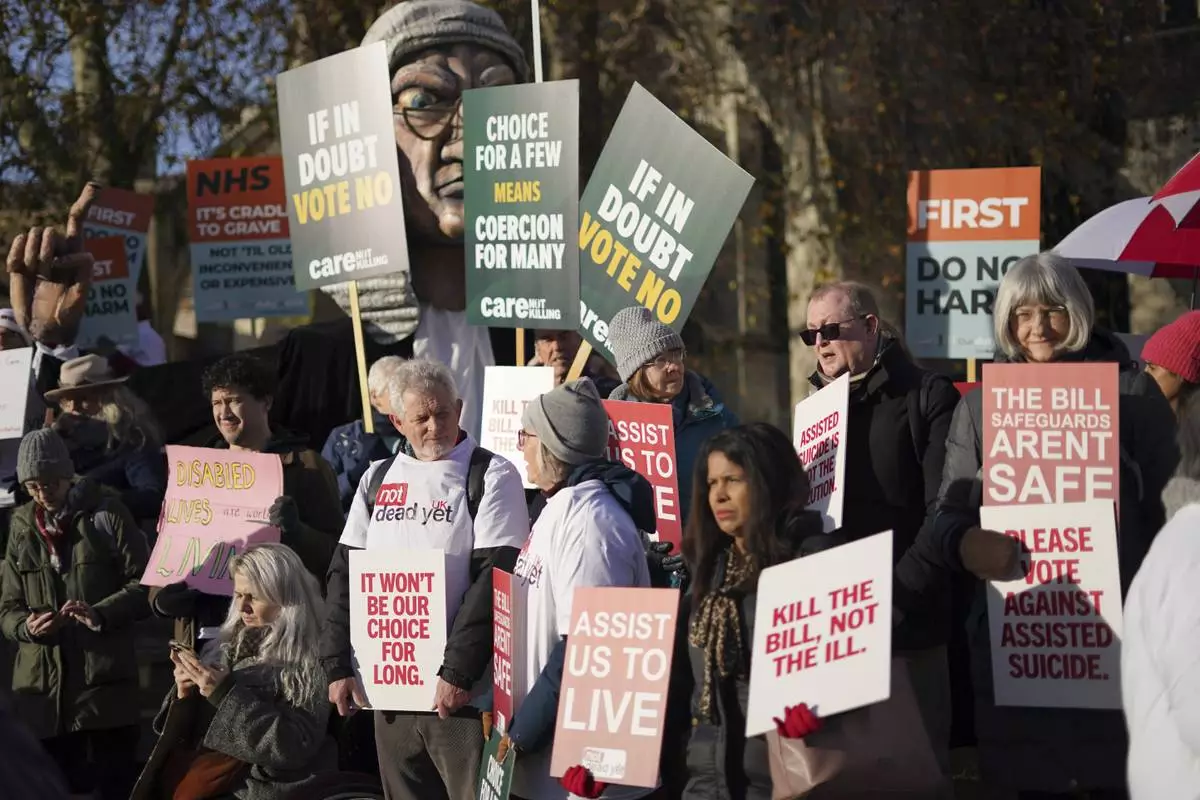
Protesters show placards in front of Parliament in London, Friday, Nov. 29, 2024 as British lawmakers started a historic debate on a proposed to help terminally ill adults end their lives in England and Wales.(AP Photo/Alberto Pezzali)
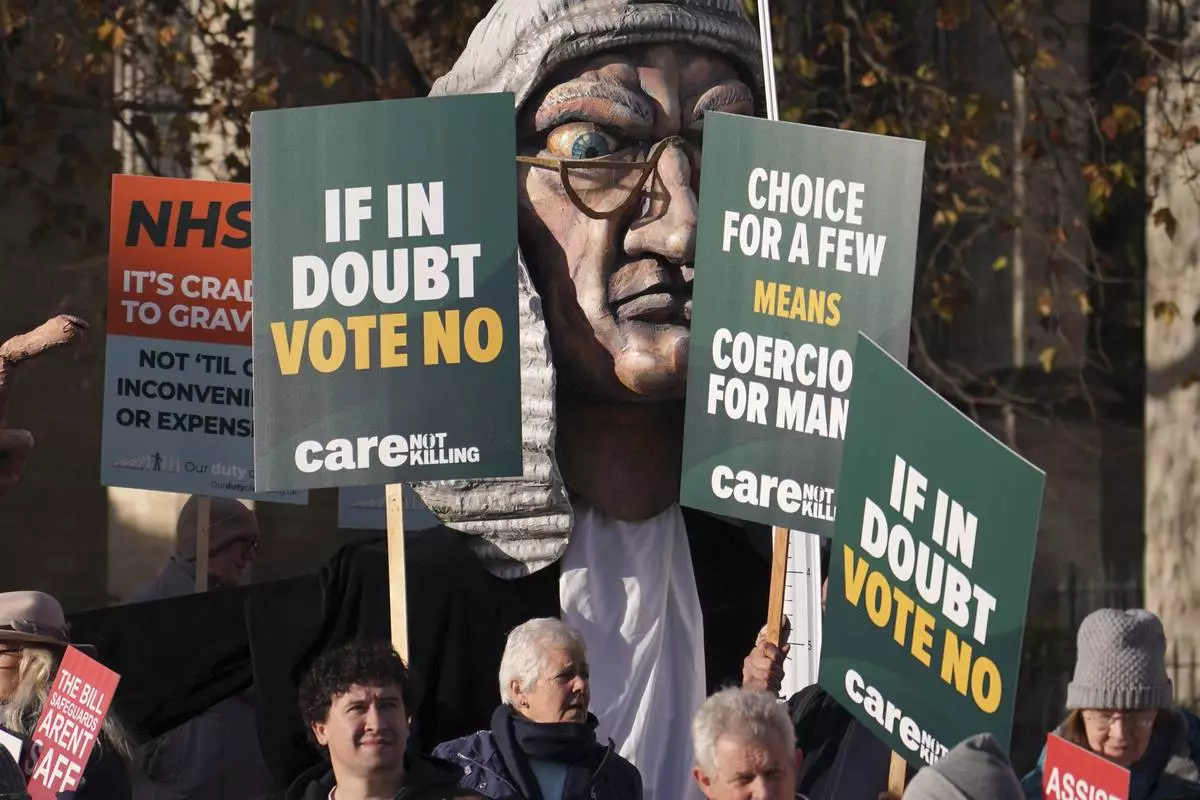
Protesters show placards in front of Parliament in London, Friday, Nov. 29, 2024 as British lawmakers started a historic debate on a proposed to help terminally ill adults end their lives in England and Wales.(AP Photo/Alberto Pezzali)
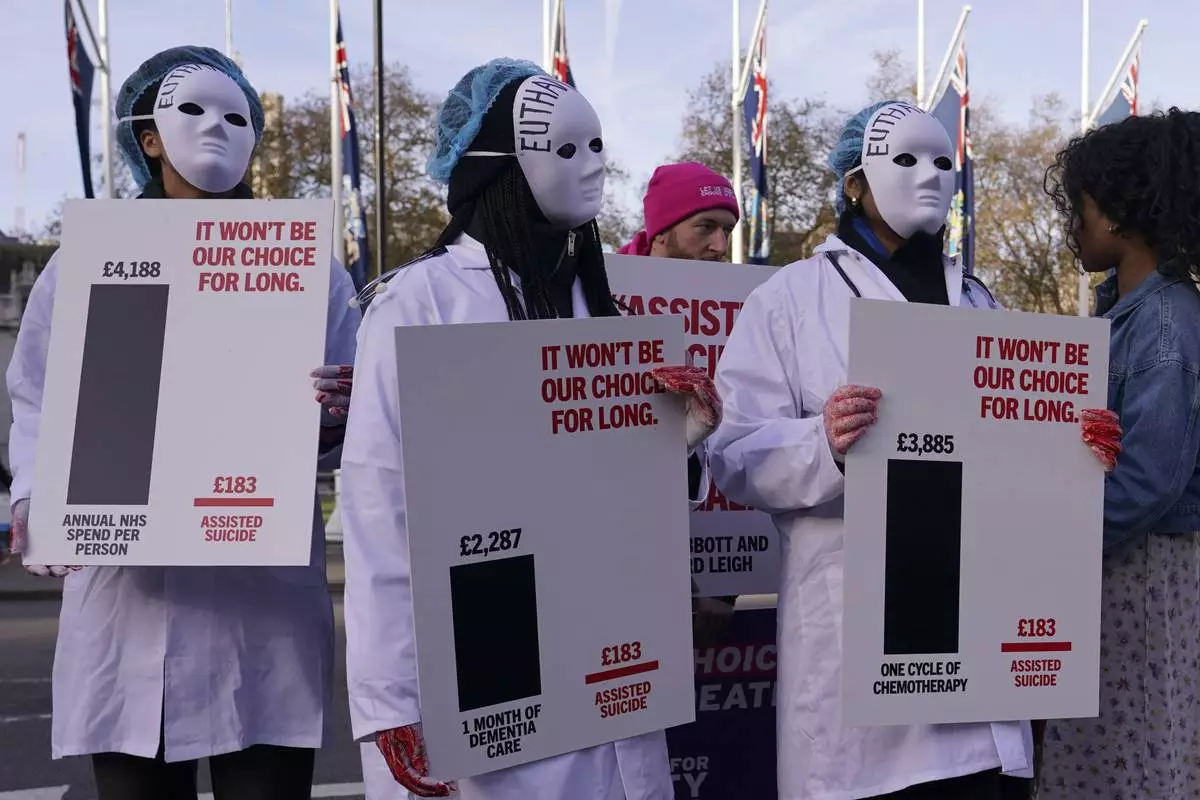
Protesters wearing masks show placards in front of Parliament in London, Friday, Nov. 29, 2024 as British lawmakers started a historic debate on a proposed to help terminally ill adults end their lives in England and Wales.(AP Photo/Alberto Pezzali)
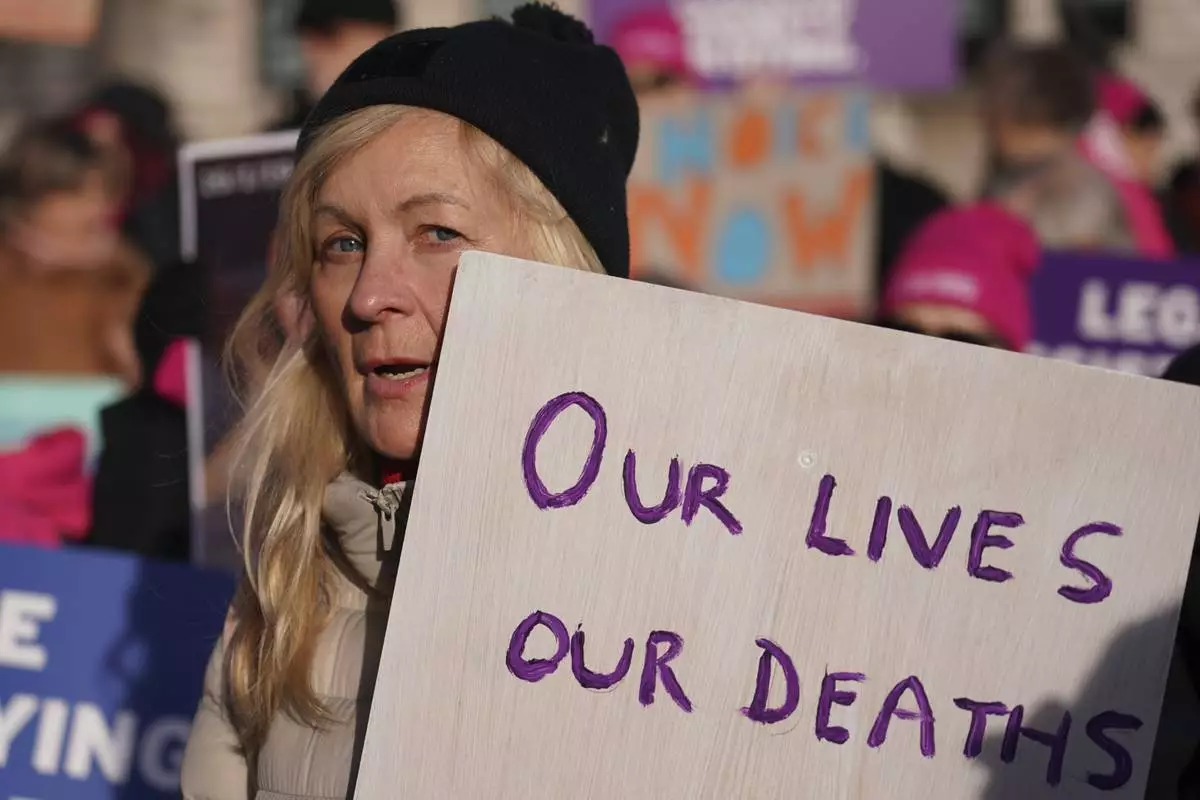
Pro legal assisted dying supporters demonstrate in front of Parliament in London, Friday, Nov. 29, 2024 as British lawmakers started a historic debate on a proposed to help terminally ill adults end their lives in England and Wales.(AP Photo/Alberto Pezzali)
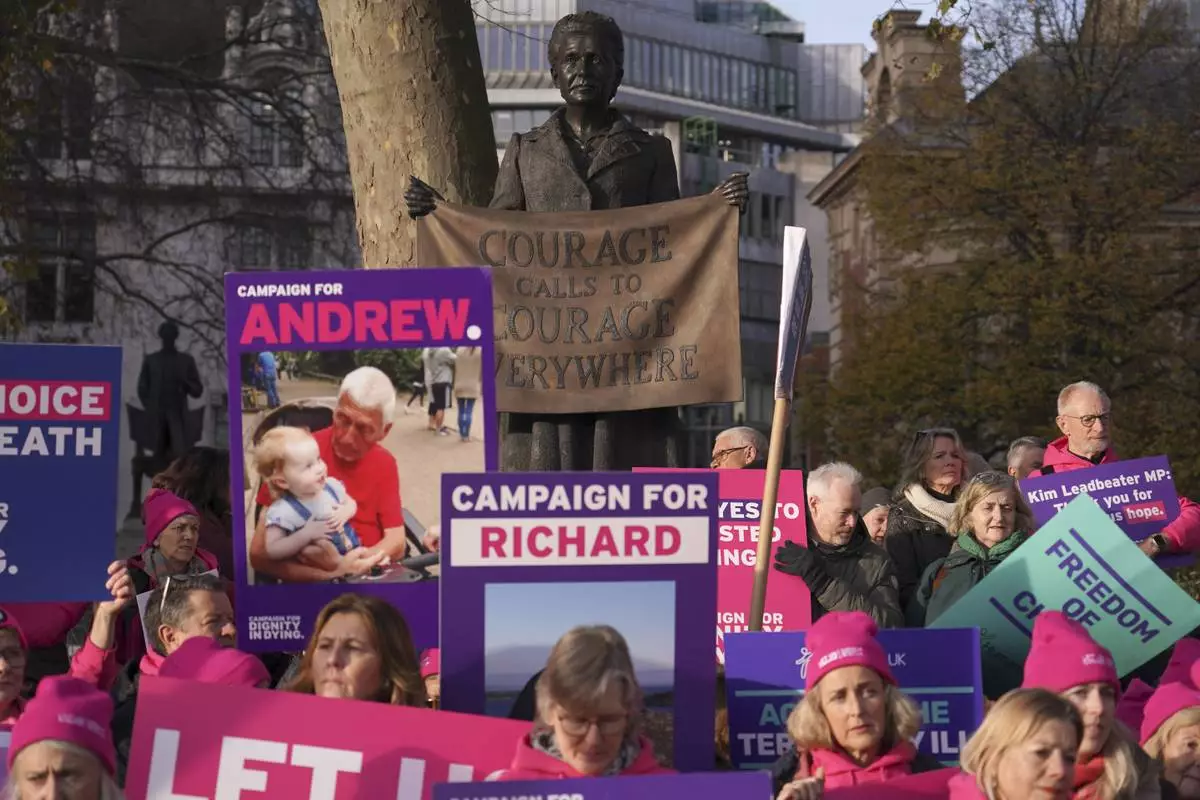
Pro legal assisted dying supporters demonstrate in front of Parliament in London, Friday, Nov. 29, 2024 as British lawmakers started a historic debate on a proposed to help terminally ill adults end their lives in England and Wales.(AP Photo/Alberto Pezzali)
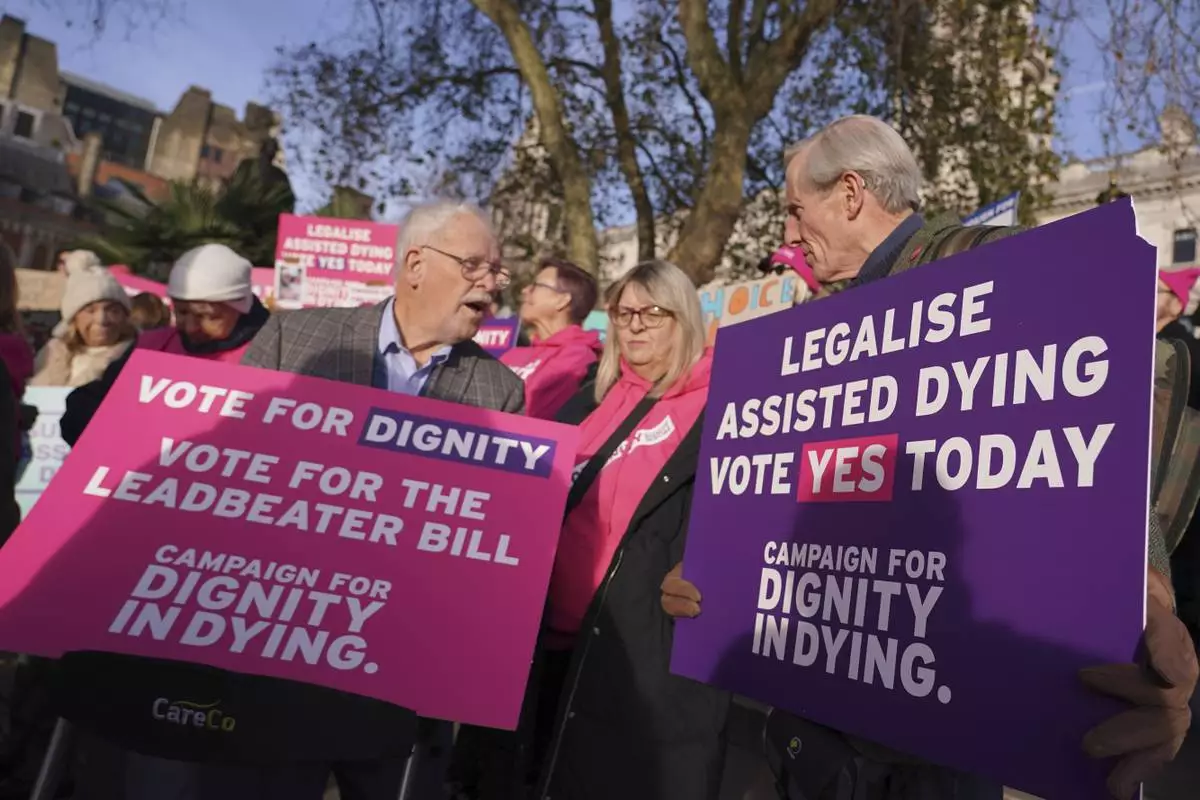
Pro legal assisted dying supporters demonstrate in front of Parliament in London, Friday, Nov. 29, 2024 as British lawmakers started a historic debate on a proposed to help terminally ill adults end their lives in England and Wales.(AP Photo/Alberto Pezzali)
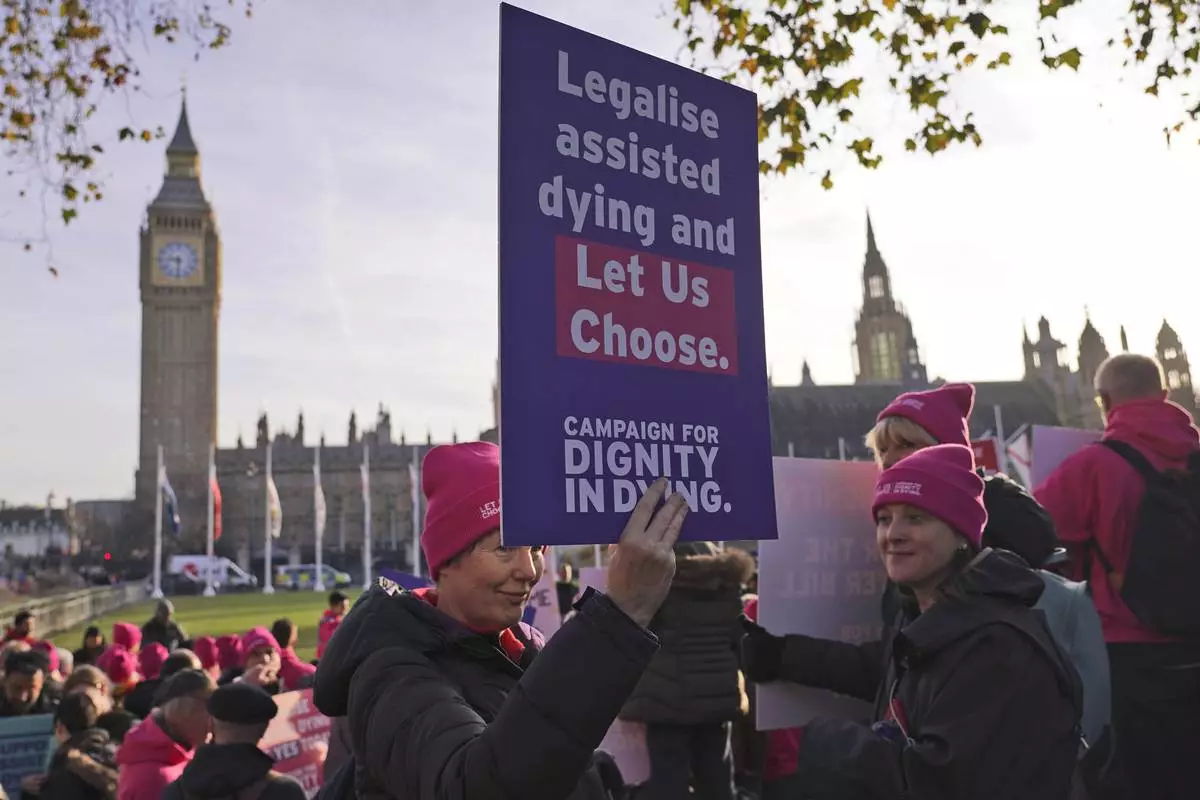
Pro legal assisted dying supporters demonstrate in front of Parliament in London, Friday, Nov. 29, 2024 as British lawmakers started a historic debate on a proposed to help terminally ill adults end their lives in England and Wales.(AP Photo/Alberto Pezzali)
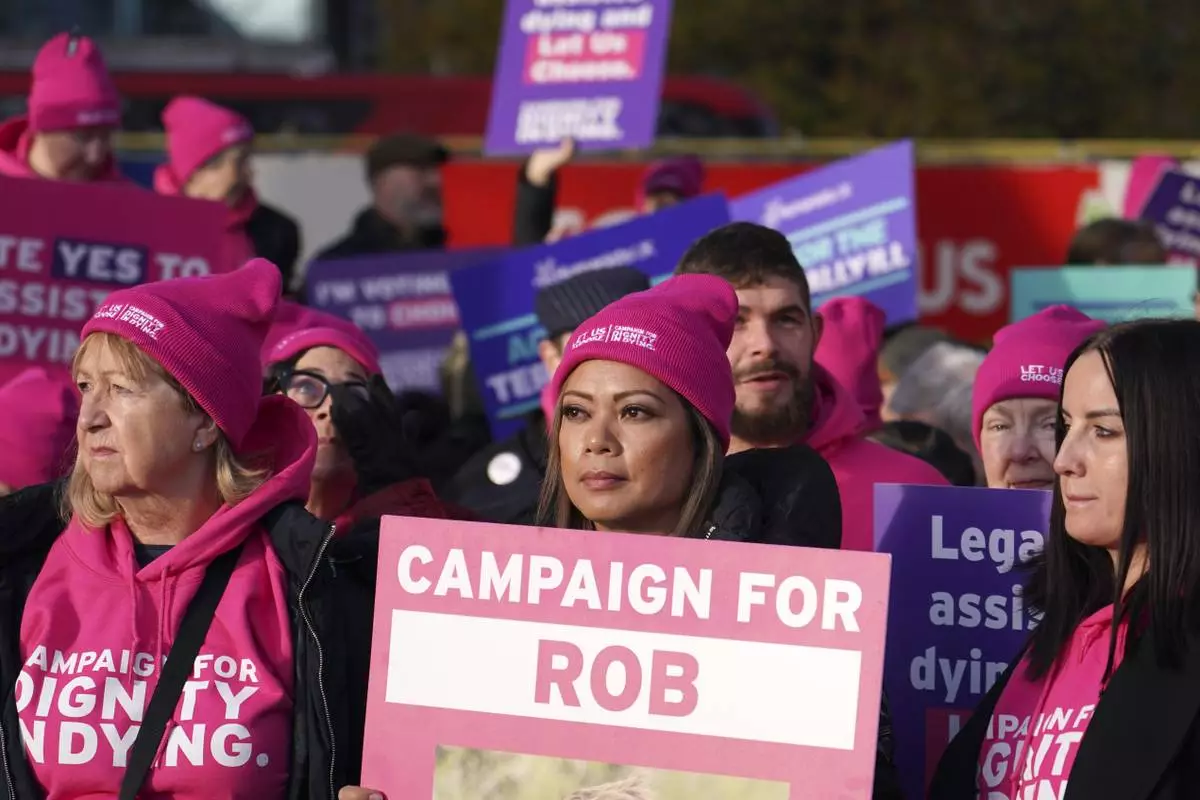
People show placards during a protest in front of Parliament in London, Friday, Nov. 29, 2024 as British lawmakers started a historic debate on a proposed to help terminally ill adults end their lives in England and Wales.(AP Photo/Alberto Pezzali)
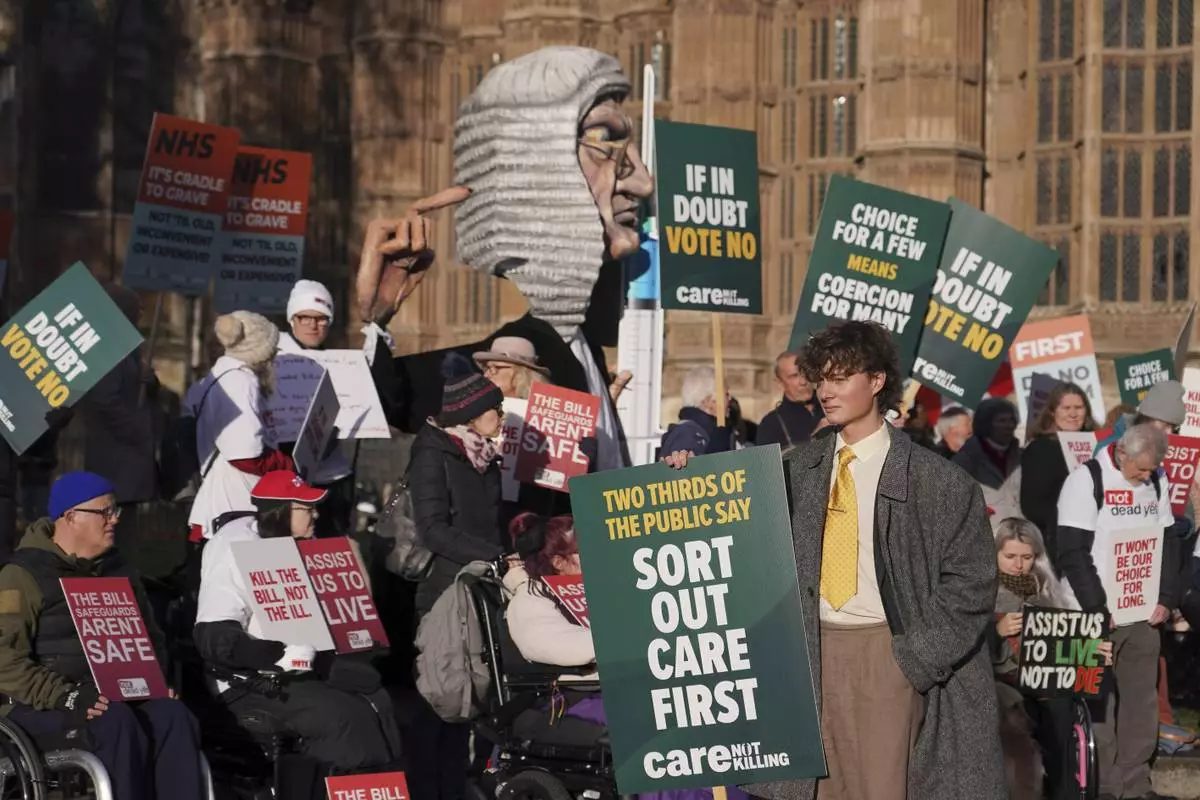
Protesters show posters and placards in front of Parliament in London, Friday, Nov. 29, 2024 as British lawmakers started a historic debate on a proposed to help terminally ill adults end their lives in England and Wales.(AP Photo/Alberto Pezzali)
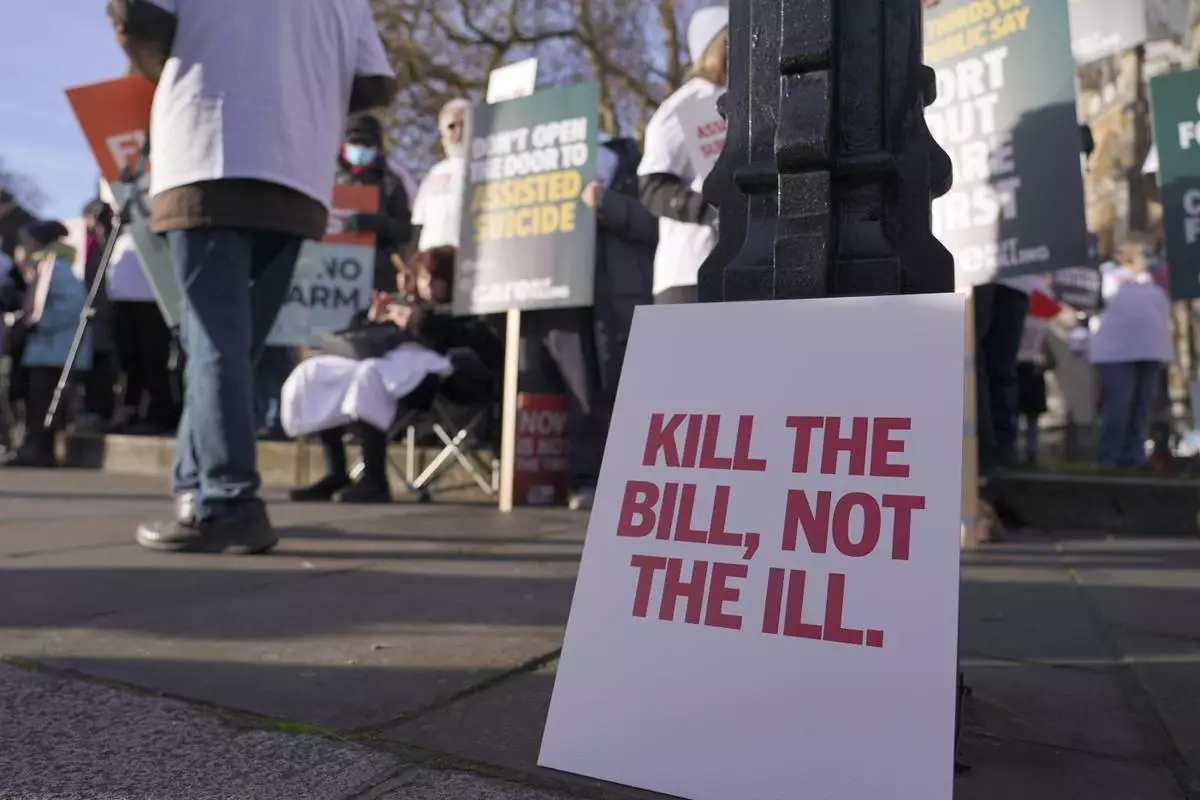
A poster leans on a lambpost as protesters demonstrate in front of Parliament in London, Friday, Nov. 29, 2024 as British lawmakers started a historic debate on a proposed to help terminally ill adults end their lives in England and Wales.(AP Photo/Alberto Pezzali)
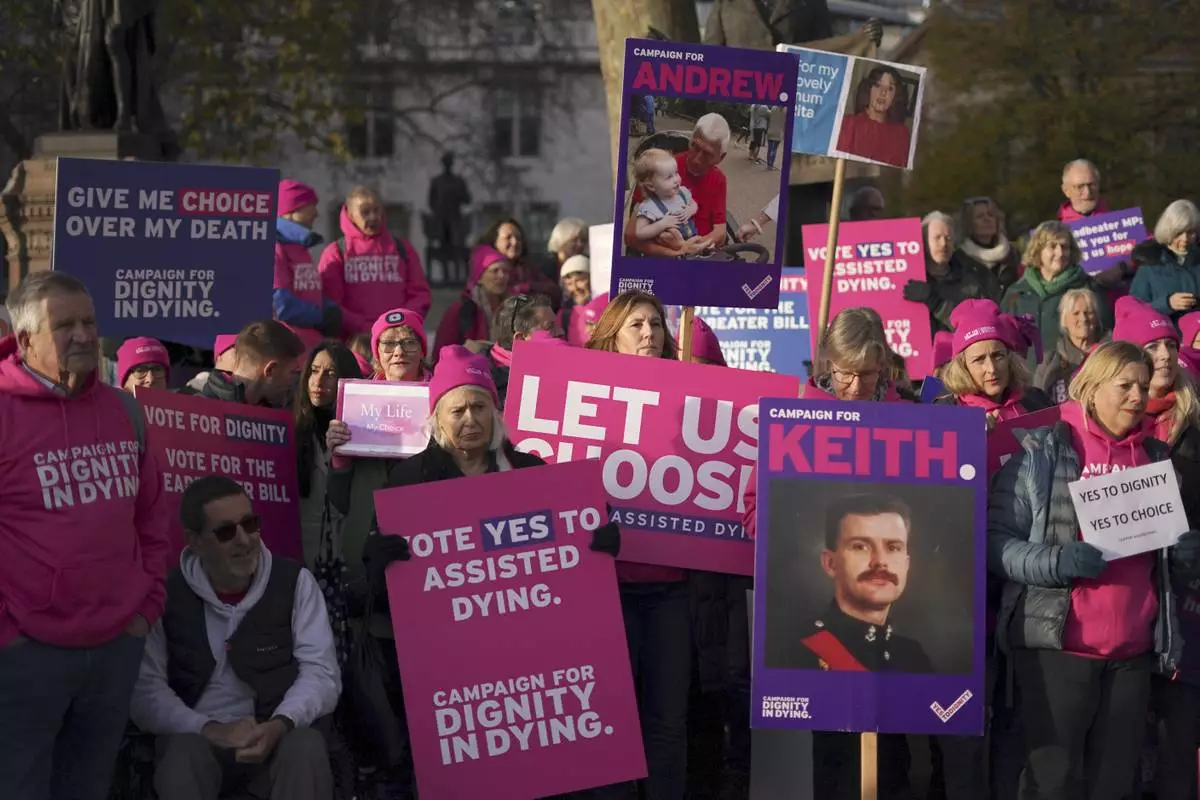
Pro legal assisted dying supporters demonstrate in front of Parliament in London, Friday, Nov. 29, 2024 as British lawmakers started a historic debate on a proposed to help terminally ill adults end their lives in England and Wales.(AP Photo/Alberto Pezzali)













